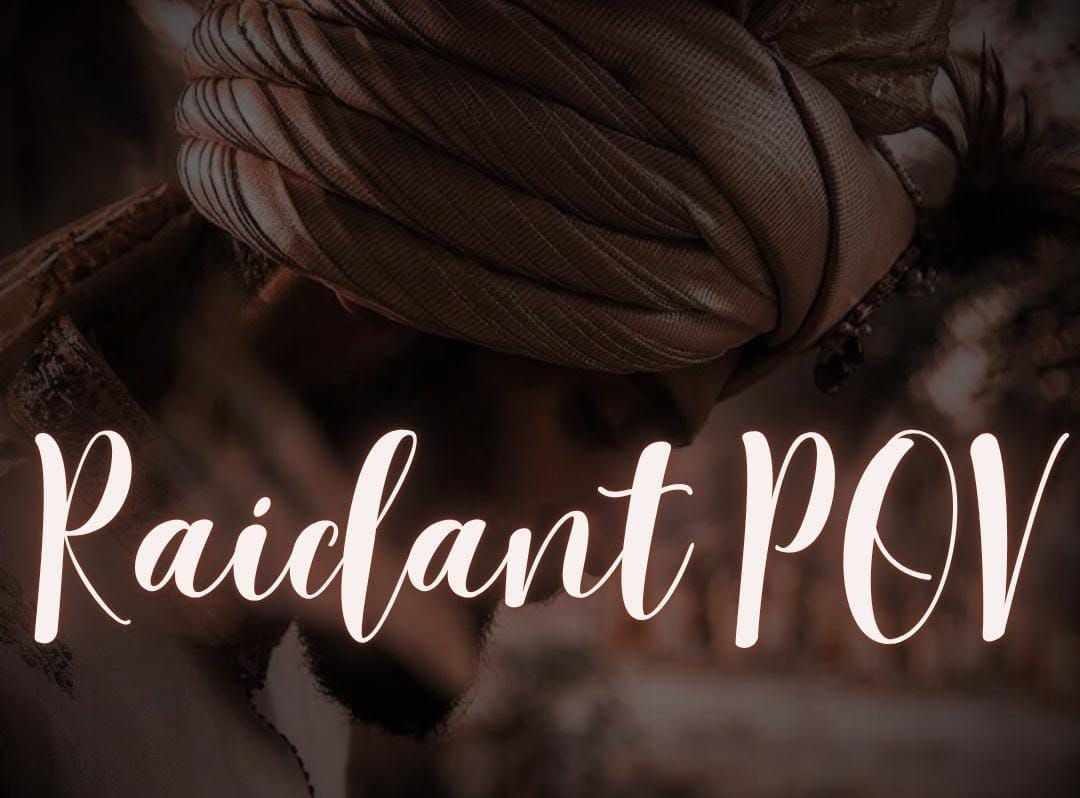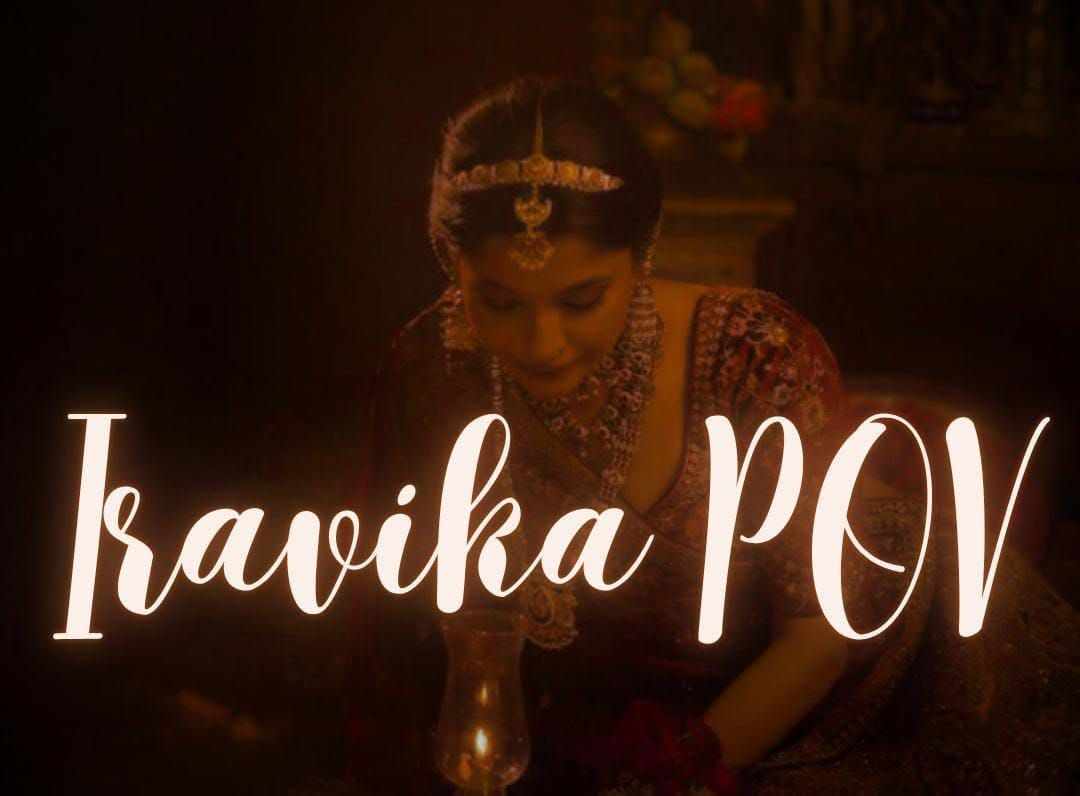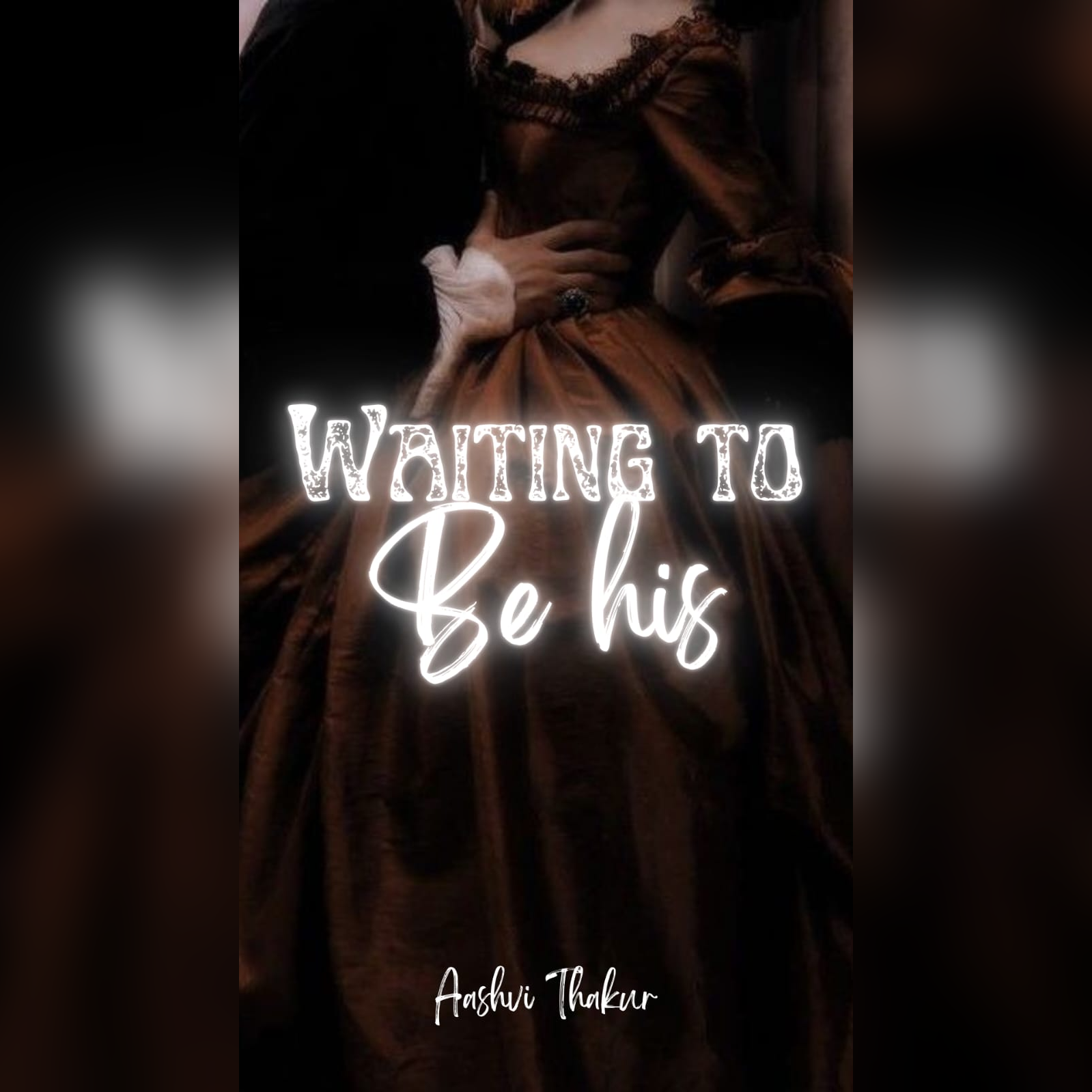
The figure on the landing moved like a slow tide—one thought arriving after another, impossible to stop. For a single endless second I waited for proof: for the face I had loved and obeyed, for the steel of my father's stare, for whatever explanation might redeem that curled scrap of paper and the crown it accompanied.
The man stepped down into the dais light. He wore the Maharaja's robe; the heavy brocade fell from broad shoulders that for a moment I believed mine. He lifted his head.
"Bapu?" I said, but the syllable was not a question so much as an incision.
He answered, not with the oak-voiced timbre of Harshvardhan, but with a rasp made narrower by fevers and fear. "Raidant beta." He breathed my name like a benediction—or a verdict.
My mouth was dry enough to stop words. Around us, men shifted like prey sensing a new shape of predator. I saw the crown in my hands refract the light into shards and I understood that whatever came next depended on the truth of this man's presence.
I stepped towards him. "Aap kaise—"
"You here—"
He put a hand to the side of his face, where a dark bruise mottled the skin. There was a silence so soft it might have been carved by wind. "Main chuhta hua tha," he said at last, voice thin, "aur ab main laut aaya hoon."
"I was taken—and now I have returned."
It was not the confession I had expected. My ribs tightened with a hostile, animal doubt. The parchment that had borne his seal was still warm in my mind. I could not reconcile.
"Bapu," I said more sharply. "Yeh kagaz—yeh shabd—kisko likha gaya? Kyon aapka mohar us par hai?"
"Father, that paper—those words—who wrote them? Why is your seal on it?"
The Maharaja's eyes flickered like old stars. He looked at the crown, at me, and then, with a movement that shook me as if the man were a brittle reed, he sank into the nearest chair. The infirmities of age and the ravages of whatever captivity he had known made themselves plain; a thin tremor passed through him.
"Beta," he whispered, "kuch haathon ne mujhe majboor kiya. Par jo hua—woh hamare rajya ke liye tha."
"Son, hands forced me. But what happened—it was for the realm."
For the realm. The three words snagged on my teeth like a bitter fruit. Were they justification? Or the lie they had been given to swallow?
I looked to my mother. Rani Diva stood near the high doors pale and composed; the coolness in her was a blade. Her glance cut to the Maharaja, then slid to me—expectant, demanding judgment. Behind her, Aaradhya watched like a hawk that had found a wounded bird.
I had to hold the line. I had to make the first ruling because in the clotted air of the hall there could be no half-measures.
"Bapu, hum saboot mang rahe hain," I said, voice even though the world burned under it. "Agar aap paritantrit hue to hum aapki raksha karenge; agar aap doshi hue to kanoon ke nazdeek laayenge."
"Father, we demand proof. If you were coerced we will protect you; if you are complicit we will bring you to law."
His hand brushed my sleeve—gentle as a passing thought. "Mera beta, jo tum sochte ho, woh sach hai..." His eyes went cloudy, and in that cloud I glimpsed a man who had been pushed to the brink. "Par asli dushman humare darwaze ke bahar nahi—woh unke andar se tha jo hamne kabhi apne ghar mein rakha tha."
"My son, what you imagine is true... But the real enemy was not outside our gates—it was within, whom we kept in our house."
The hall exhaled. The statement was confession and accusation braided into one. I did not know whether to loosen my sword or tighten my fist.

I had expected a scene of accusation—verdant and brutal—but this collapse of certainty was worse. The Maharaja's tremor had something like truth to it; it stripped the edges off the conspiracy and made it shamefully human.
I stepped forward, the hem of my gown whispering over the scorched marble. The crown still glittered in my hands. Its weight felt different now—less talisman, more fuse.
"Rajmata," I said, turning to Yashodhara, "aapne kya dekha? Aapka aadesh Arjun ko diya gaya tha—aur ab Rajmata khud is mayaajaal ka hissa nikli. Hume sach chahiye."
"Queen Mother, what did you see? You gave Arjun orders—and now you yourself are entangled. We need truth."
Yashodhara's composure broke in the tiniest of fractures. For a woman who had held a thousand courts in a palm of silk, the weariness around her eyes was more eloquent than any speech.
"Humne socha tha is desh ke liye behtar hai," she said in a voice like spun metal. "Lekin jab unhone humse zyada maang liya—jab humare bachon ki raksha ke naam par unhone hamari maryada chheen li—humne keh diya..."
"I thought it was for the realm's good. But when they demanded more—when in the name of protecting our children they stripped my dignity—I said yes..."
Her confession slithered between the pillars. It was not an absolution but a splintering of conscience. Around us, faces shifted; I thought I saw Akshat's jaw harden as if he had swallowed a bitter root.
"Rajmata, aapka 'haan' kisi ki jaan le chuka," Akshat said then, blunt as a spear. "Aur ab humne us 'haan' ko ulatna hai."
"Queen Mother, your 'yes' has taken lives. Now we must reverse that 'yes'."
At that, Rani Diva's lips moved but made no sound—her expression a scale balancing vengeance and mercy. Aaradhya's cold eyes narrowed into knives.
I felt Raidant's hand on my back—an anchor. His presence steadied the tilt of the room. "Hum saboot dhundenge," he said into my ear, a pledge that sounded like oath. "Aur jo bhi zimmedar hai, we will bring him to the dais."
"We will find proof—and whoever is responsible, we will bring to the dais."
ANAYA POV
They turned toward me as if my tongue had some map. I had run from the kitchens to the courtyard to a post at the stables—my world was small and swift and the kind of work that forced truth out of men like an animal from its den. A rider had been caught near the carriage lane: a man with scorch on his cloak and a new scar across his cheek.
I brought him forward. He trembled and his speech came in stitched pieces.
"Main... main sirf referrer hoon," he said. "Mujhe bheja gaya tha rasta kholne ke liye. Humne ek aur rasta dekha—seedha North Road... ghodi khaali thi. Par wahaan ek baar... ek patthar mila... us par teekhe nishaan."
"I'm only a runner. I was sent to open a passage. We saw another road—North Road... the horse was empty. But there was a stone there—marked."
He pointed with a shaking hand. Where his finger landed on the map the room seemed to narrow. The mark was the same coiled serpent sewn in silver thread.
Akshat cursed under his breath. "Yeh naya nishan hai. Nai sena—na ghazi, na Rathore. Ek teesre ghar ka nishan."
"This is a new mark. Not Ghazi, not Rathore. The sigil of a third house."
I had heard the rumors of mercenary bands from the west, a shadow cabal that traded swords for crowns. Now they wore their sign by the orchard paths like a promise of coming winters.
I looked at Iravika. The queen's jaw was set like forged steel. "Toh humare pass teen dushman hai: Rajmata ka saath, Gaurav, aur ye teesra—jo ab naam lena hai."
"So we have three enemies: the Queen Mother's network, Gaurav, and this third—whose name we must learn."
Raidant lifted the crown like a banner and his eyes narrowed until they were dark pools of decision.
"Agli subah hum North Road pe jayenge," he declared. "Akshat, Shaurya—tum dono mere saath. Iravika, tum Anaya ke saath palace ke andar proof collect karogi. Humko har choti si jankari chahiye."
"At dawn we go to North Road. Akshat, Shaurya—you accompany me. Iravika, you and Anaya will search the palace for proof. We need every scrap of information."
I bowed my head. The work was dull and delicate, and it would need my hands.

Night tightened like a fist round Mehrawan. Orders were given: watch the gates, call the riders, gather the ink of testimony. Men and women moved like clockwork, preparing for dawn's hunt.
As the company dispersed, a small, purposeful figure lingered in the shadow of the dais. The figure's face was half-hidden; only a single glint—a signet ring—caught the torchlight. It was the same ring I had seen in the archives, the same that had survived the scuffle. The stranger—no soldier, no courtier—stepped forward and let a folded sheet fall at the Maharaja's feet.
No one spoke. The parchment's edges trembled in the hush. I watched as the Maharaja bent and picked it up. His face went pale, and for a breath the hall felt as if it had slipped on ice.
He read, mouth moving with the slow cruelty of translation.
Then he looked up.
"Yeh... yeh tumhare liye hai, beta," he said, and his voice was barely more than a ghost. "From the man who called for our ruin."
"This is for you, son. From the man who asked for our ruin."
Raidant's hand closed like a trap around the crown. He did not speak. He did not move.
Outside, beyond the broken western gate, a banner lifted and another horn sounded—a long, slow keening that spoke of a force gathering and of choices made in the dark.
On the dais, the Maharaja's eyes met his son's. A scrap of ink lay between them, and inside that ink the path forked into three possible deaths.
The chapter falls to a single line the old king read aloud, which everyone heard as if it were the seal of fate.
"'Come at dawn—bring the crown—and your house will be spared.'"
The hall exhaled. The crown trembled in Raidant's hands like a thing that could decide whether we were to live or perish.
Dawn would bring sword and answer.
But before dawn, a horse beat at the outer cord—rapid, urgent—and a voice from the courtyard shouted a name no one wished to hear.
"Gaurav!" the rider cried.
Every head turned as the shadow of a man crossed the western lintel.
And the torchlight found him smiling.


Write a comment ...